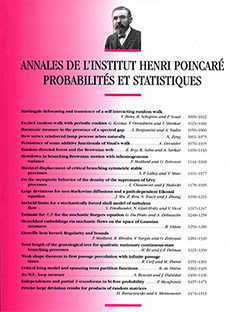Abstract
Let Ψn be a product of n independent, identically distributed random matrices M, with the properties that Ψn is bounded in n, and that M has a deterministic (constant) invariant vector. Assume that the probability of M having only the simple eigenvalue 1 on the unit circle does not vanish. We show that Ψn is the sum of a fluctuating and a decaying process. The latter converges to zero almost surely, exponentially fast as n→∞. The fluctuating part converges in Cesaro mean to a limit that is characterized explicitly by the deterministic invariant vector and the spectral data of $\mathbb{E}[M]$ associated to 1. No additional assumptions are made on the matrices M; they may have complex entries and not be invertible.
We apply our general results to two classes of dynamical systems: inhomogeneous Markov chains with random transition matrices (stochastic matrices), and random repeated interaction quantum systems. In both cases, we prove ergodic theorems for the dynamics, and we obtain the limit states.
On considère le produit Ψn de n matrices aléatoires M i.i.d. ayant les propriétés suivantes: la suite (Ψn)n est bornée et M possède un vecteur invariant déterministe (constant). On suppose que la probabilité pour que, sur le cercle unité, M possède une unique valeur propre simple en 1 soit non nulle. On montre que Ψn est la somme d’un processus fluctuant et d’un processus décroissant. Ce dernier tend vers zéro presque sûrement et exponentiellement rapidement lorsque n tend vers l’infini. Le terme fluctuant converge en moyenne de Cesaro vers une limite caractérisée explicitement par le vecteur invariant déterministe et par les données spectrales associées à la valeur propre 1 de la matrice $\mathbb{E}[M]$. Aucune hypothèse supplémentaire n’est faite sur les matrices M; elles peuvent être à valeurs complexes et pas nécessairement inversibles.
On applique les résultats généraux à deux classes de systèmes dynamiques: les chaînes de Markov inhomogènes avec matrices de transition aléatoires (matrices stochastiques), ainsi que les systèmes quantiques avec interactions répétées et aléatoires. Dans les deux cas, on prouve des résultats d’ergodicité pour la dynamique et on détermine les états limites.
Citation
Laurent Bruneau. Alain Joye. Marco Merkli. "Infinite products of random matrices and repeated interaction dynamics." Ann. Inst. H. Poincaré Probab. Statist. 46 (2) 442 - 464, May 2010. https://doi.org/10.1214/09-AIHP211
Information





